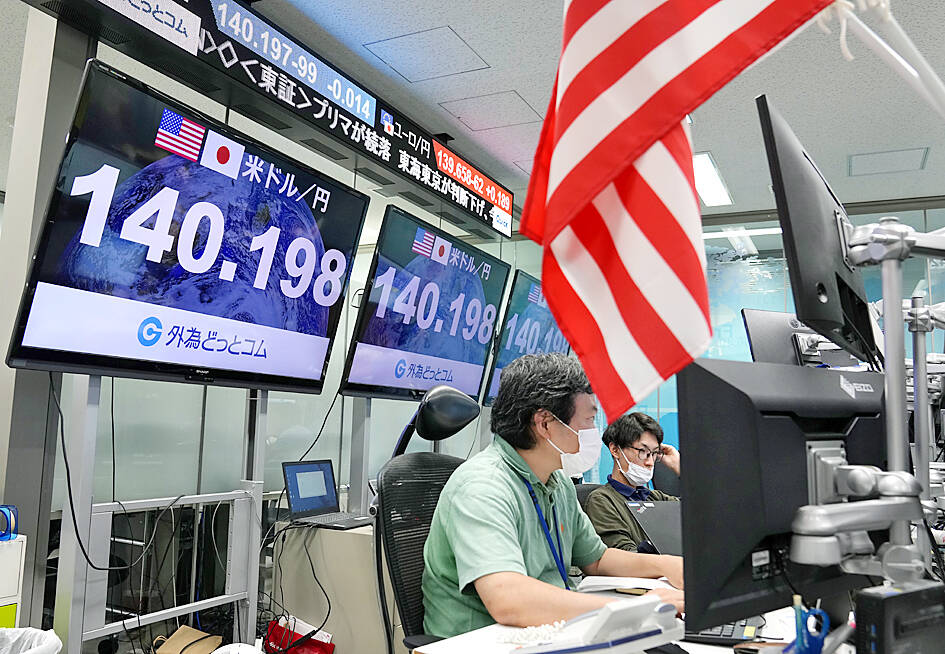The dollar on Friday eased from a 20-year high after data showed the pace of US hiring rose more than expected last month, but wage growth moderated and unemployment ticked higher, giving the US Federal Reserve some wiggle room when it raises interest rates later this month.
The US economy added 315,000 jobs last month, data showed, topping the consensus forecast of 300,000 jobs by economists polled by Reuters, and marking the 20th straight month of job growth.
The dollar index, which tracks the currency against six counterparts, zig-zagged following the report, in thin trading ahead of the long US Labor Day weekend.

Photo: EPA-EFE
The US currency was down 0.07 percent at 109.61, but was still up 0.74 percent for the week for its third straight weekly gain.
The greenback rose NT$0.057 to close at NT$30.588, its highest level against the New Taiwan dollar in 34 months. On Oct. 21, 2019, the NT dollar was NT$30.611 against the US dollar.
“Nonfarm payrolls being mixed was an excuse to book profit in the dollar’s surge to 20-year highs,” Convera senior market analys Joe Manimbo said.
The US currency leaped to its strongest level since June 2002 on Thursday, 109.99, and has been riding high since Fed Chairman Jerome Powell said at the Jackson Hole, Wyoming, symposium on Aug. 26 that rates would need to be high “for some time” to combat stubbornly high inflation.
“Overall what we’re seeing is the market is still bracing for potentially much more aggressive Fed tightening,” Oanda senior market analyst Edward Moya said.
Fed funds futures were unchanged after the jobs report and are pricing a 75 percent chance that the Fed hikes rates by 75 basis points this month, Refinitiv data showed.
The euro was up 0.21 percent, retracing some of the previous day’s losses against the dollar, but sitting below parity at US$0.9965.
The European Central Bank is due to meet next week, with money markets betting on an unprecedented 75 basis point hike.
Sterling dipped 0.24 percent versus the dollar to US$1.1516, on track to end the week down around 1.9 percent. Britain’s new prime minister is to be announced tomorrow, when the ruling Conservative Party’s leadership contest concludes, which could prompt further pound moves.
Against the rate-sensitive yen, the dollar was up 0.04 percent at ¥140.125.
The dollar surged above ¥140 for the first time since 1998 on Thursday.
Japan’s government is to take “appropriate” action as needed, Japanese Minister of Finance Shunichi Suzuki said on Friday.
Additional reporting by staff reporter, with CNA

The US dollar was trading at NT$29.7 at 10am today on the Taipei Foreign Exchange, as the New Taiwan dollar gained NT$1.364 from the previous close last week. The NT dollar continued to rise today, after surging 3.07 percent on Friday. After opening at NT$30.91, the NT dollar gained more than NT$1 in just 15 minutes, briefly passing the NT$30 mark. Before the US Department of the Treasury's semi-annual currency report came out, expectations that the NT dollar would keep rising were already building. The NT dollar on Friday closed at NT$31.064, up by NT$0.953 — a 3.07 percent single-day gain. Today,

‘SHORT TERM’: The local currency would likely remain strong in the near term, driven by anticipated US trade pressure, capital inflows and expectations of a US Fed rate cut The US dollar is expected to fall below NT$30 in the near term, as traders anticipate increased pressure from Washington for Taiwan to allow the New Taiwan dollar to appreciate, Cathay United Bank (國泰世華銀行) chief economist Lin Chi-chao (林啟超) said. Following a sharp drop in the greenback against the NT dollar on Friday, Lin told the Central News Agency that the local currency is likely to remain strong in the short term, driven in part by market psychology surrounding anticipated US policy pressure. On Friday, the US dollar fell NT$0.953, or 3.07 percent, closing at NT$31.064 — its lowest level since Jan.

Hong Kong authorities ramped up sales of the local dollar as the greenback’s slide threatened the foreign-exchange peg. The Hong Kong Monetary Authority (HKMA) sold a record HK$60.5 billion (US$7.8 billion) of the city’s currency, according to an alert sent on its Bloomberg page yesterday in Asia, after it tested the upper end of its trading band. That added to the HK$56.1 billion of sales versus the greenback since Friday. The rapid intervention signals efforts from the city’s authorities to limit the local currency’s moves within its HK$7.75 to HK$7.85 per US dollar trading band. Heavy sales of the local dollar by

The Financial Supervisory Commission (FSC) yesterday met with some of the nation’s largest insurance companies as a skyrocketing New Taiwan dollar piles pressure on their hundreds of billions of dollars in US bond investments. The commission has asked some life insurance firms, among the biggest Asian holders of US debt, to discuss how the rapidly strengthening NT dollar has impacted their operations, people familiar with the matter said. The meeting took place as the NT dollar jumped as much as 5 percent yesterday, its biggest intraday gain in more than three decades. The local currency surged as exporters rushed to